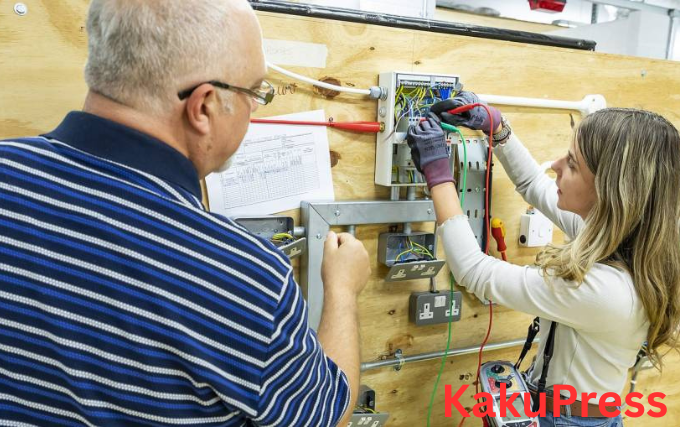Electricians are among the most in-demand tradespeople in the UK, with career opportunities spanning domestic, commercial, and industrial sectors. If you’re serious about joining the industry, you’ll need to follow a recognised training route to become fully qualified. Two resources are particularly useful at the start of your journey: the NVQ Level 3 Electrical qualification — the benchmark for industry recognition — and this step-by-step guide on How to Become an Electrician, which explains the process from beginner training to securing your ECS Gold Card.
Why Electrician Training Matters
Electrical work is highly skilled, safety-critical, and regulated by strict industry standards. Whether you’re wiring a new home, fitting a commercial lighting system, or maintaining industrial machinery, the work must comply with the UK’s wiring regulations and pass inspection. This means that practical skills, technical knowledge, and professional certification are essential.
Proper training gives you the expertise to work safely and effectively while meeting the standards employers, clients, and regulatory bodies expect. Without recognised qualifications, you cannot legally carry out most electrical installation or inspection work.
The Standard Pathway to Becoming Qualified
While some learners enter the trade via apprenticeships and others through adult retraining, the journey to becoming a qualified electrician usually follows three core stages.
1. Level 2 Diploma in Electrical Installation
This is the entry point for most learners with no prior experience. It covers:
- Basic electrical theory and principles
- Installation methods and materials
- Health and safety practices
- Introduction to wiring regulations
By the end of Level 2, you’ll understand the fundamentals and be prepared for more advanced training.
2. Level 3 Diploma in Electrical Installation
Level 3 expands upon the foundation established in Level 2, delving into the following areas:
- Advanced electrical science
- Fault finding and diagnostics
- Inspection and testing
- 18th Edition Wiring Regulations
This course is a stepping stone to entering the workforce and starting your work-based qualification.
3. NVQ Level 3 Electrical Qualification
The NVQ Level 3 Electrical is a work-based qualification where you prove your competence on real installations. It involves building a portfolio of evidence from your job role, demonstrating skills in a range of electrical tasks. The final stage is the AM2 — a practical assessment under exam conditions that confirms your readiness to work as a fully qualified electrician.
The ECS Gold Card
Once you’ve completed your NVQ Level 3 and passed the AM2, you can apply for your ECS Gold Card. This card is highly regarded within the industry and is frequently required for access to construction sites or major electrical projects.
Experienced Worker Routes
Electricians with years of hands-on experience but no formal qualification may qualify for the Experienced Worker Route. This pathway allows you to complete your NVQ Level 3 by proving your existing competence through workplace assessments, avoiding the need to restart from Level 2:
How Long Does the Process Take?
- Full-time learners: Level 2 and Level 3 can be completed in 12–18 months, with the NVQ and AM2 taking a further 6–12 months.
- Part-time students: typically finish the programme within a timeframe of 2 to 4 years.
- Experienced workers: May achieve the NVQ in under a year if they can quickly provide the required evidence.
Choosing the Right Training Provider
When selecting a training provider, look for:
- Accredited qualifications (City & Guilds or EAL)
- Modern facilities with realistic workshop setups
- Experienced tutors with industry backgrounds
- Progression routes from beginner level through to NVQ
- Support services for portfolio completion and job placement
Some providers also offer blended learning options, allowing you to combine classroom sessions with online study and practical site work.
Career Opportunities and Salaries
Once qualified, electricians can work across a wide range of environments, including:
- Domestic housing projects
- Commercial properties
- Industrial facilities
- Renewable energy installations (solar, EV charging, battery storage)
- Inspection and testing services
Newly certified electricians generally earn starting salaries ranging from £28,000 to £35,000 annually With experience, this can rise to £40,000–£50,000+, and self-employed electricians often earn more depending on their specialism and location.
Why Start Now?
The UK’s drive towards energy efficiency, smart technology, and green energy is creating new opportunities for electricians. From retrofitting old buildings with energy-saving systems to installing the latest renewable technologies, the industry is evolving fast — and trained professionals are in high demand.
By starting your training now, you’ll position yourself to take advantage of these opportunities as they grow. The sooner you complete your qualifications, the sooner you can start benefiting from stable work and strong earnings.
Final Thoughts
Electrician training is an investment in a career that’s practical, respected, and future-proof. By following a clear path — starting with beginner training, progressing through to your NVQ Level 3 Electrical qualification, and using guides like How to Become an Electrician — you can build the skills, knowledge, and qualifications needed to thrive in the industry.
With demand for skilled electricians set to rise, there’s no better time to get started.







